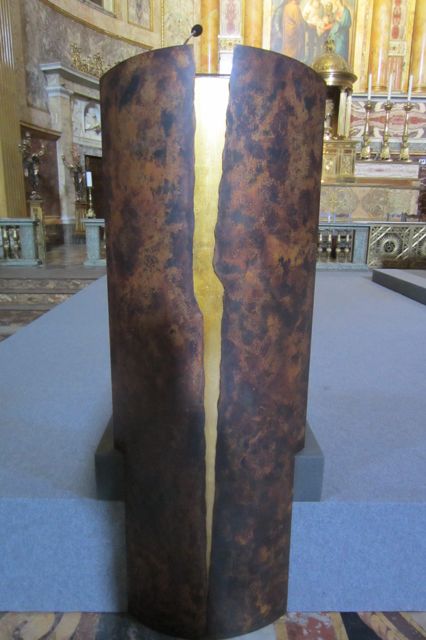
This is a lectern in Rome in a Jesuit church. Sometimes we use form to express meaning and indeed art in churches can do a lot to make meaning visual.
I love the way the gorgeous wood has been ripped open to reveal a golden crack. The image is evocative of the way we open the book – scriptures – and so from a bit of pulp covered in leather and inscribed with black dye, we open God’s word to reveal the great Wound of Knowledge – that which we come to know which we can never not know. The very lectern speaks of its use – opening something rather mundane to reveal an interior miracle at work.
Yesterday at a staff meeting Mary Beth told a story about her ministry of hospitality. She is in close proximity to the homeless men and women who come to the cathedral looking for some peace and kindness in a life which seems to provide little of each to them. She met one man whose is not only homeless, but has cancer and is actively dying. It is hard for my brain to process the picture in my mind. When I have a cold, all I want is to curl up in my warm, soft bed and drink hot tea and call my friends for a bit of sympathy. Amid all the physical agony and loss of dignity which cancer can bring, what must that be like to manage in a cold night, on a cement slab, without contact with the people who love you – not so much as a hot cup of tea or an aspirin for comfort or pain relief?
Mary Beth, of course, engaged the homeless man and took him to a hotel room where he could be assured of one night of ease n his suffering and in that act – that one act of mercy and kindness – gained the love and respect of an entire community of homeless people looking out, as they do, for people who see them as real human beings.
When the veneer of our polished selves, rich in the mahogany of our station in life, is torn open to reveal the golden rip of compassion or empathy, then the Word made flesh has meaning and can begin to heal the leprosy of our comforts, soothe the infestation of our pride and mold us into the wounded Savior whom we say we want to emulate.
How do they know we are Christians? Not by what happens in our church, but rather, by what happens next to it.

